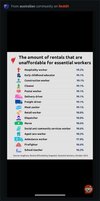Why do you think people are placing career over kids?You are being a bit defeatist. The structural barriers that you allude to are there. But we are also seeing the emergence of personal choices not to have children becoming quite a dominant force. It's become much more accepted to place career progression in front of family commitments.
This will have the consequences of a reduced tax base and fewer people of working age to manage what will be an increasing demand on health and social security services for an all too overrepresented senior population.
There is only so much a turn around in economic conditions can do without there also being a turn around in societal attitudes towards actually having and raising children.

Could it possibly be that’s their only chance to achieve any sort of financial stability? That kids would end any chance of that?




